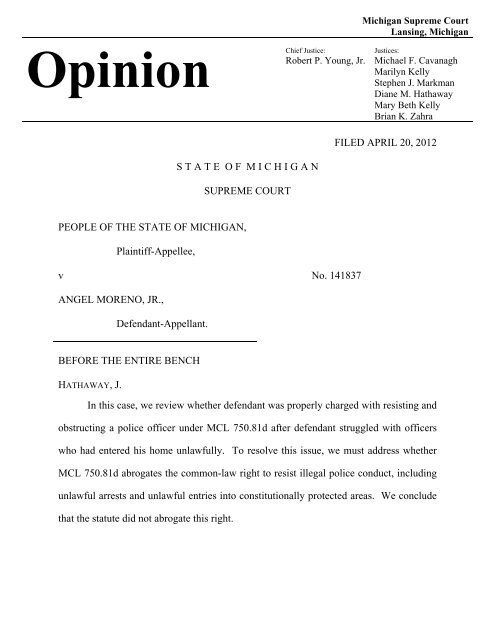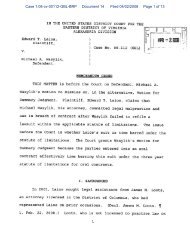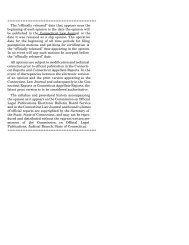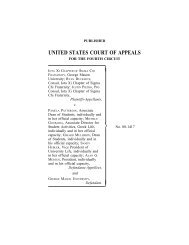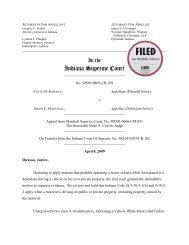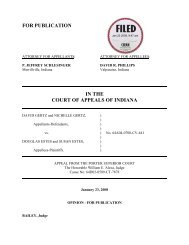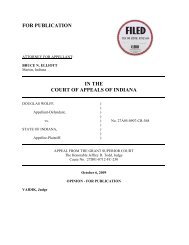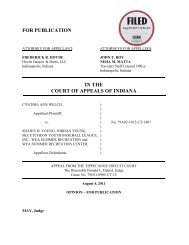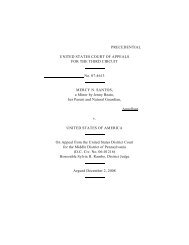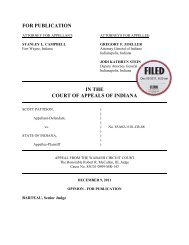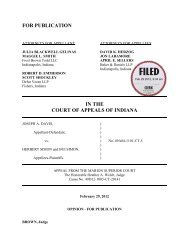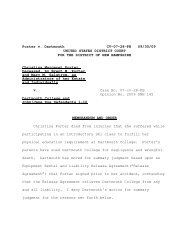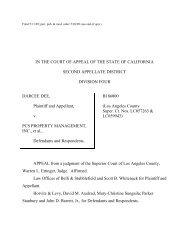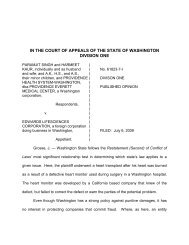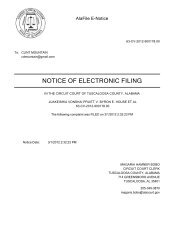141837-Opinion - Michigan Courts - State of Michigan
141837-Opinion - Michigan Courts - State of Michigan
141837-Opinion - Michigan Courts - State of Michigan
Create successful ePaper yourself
Turn your PDF publications into a flip-book with our unique Google optimized e-Paper software.
<strong>Opinion</strong><br />
PEOPLE OF THE STATE OF MICHIGAN,<br />
Plaintiff-Appellee,<br />
S T A T E O F M I C H I G A N<br />
SUPREME COURT<br />
v No. <strong>141837</strong><br />
ANGEL MORENO, JR.,<br />
Defendant-Appellant.<br />
BEFORE THE ENTIRE BENCH<br />
HATHAWAY, J.<br />
FILED APRIL 20, 2012<br />
In this case, we review whether defendant was properly charged with resisting and<br />
obstructing a police <strong>of</strong>ficer under MCL 750.81d after defendant struggled with <strong>of</strong>ficers<br />
who had entered his home unlawfully. To resolve this issue, we must address whether<br />
MCL 750.81d abrogates the common-law right to resist illegal police conduct, including<br />
unlawful arrests and unlawful entries into constitutionally protected areas. We conclude<br />
that the statute did not abrogate this right.<br />
Chief Justice:<br />
Robert P. Young, Jr.<br />
<strong>Michigan</strong> Supreme Court<br />
Lansing, <strong>Michigan</strong><br />
Justices:<br />
Michael F. Cavanagh<br />
Marilyn Kelly<br />
Stephen J. Markman<br />
Diane M. Hathaway<br />
Mary Beth Kelly<br />
Brian K. Zahra
While the Legislature has the authority to modify the common law, it must do so<br />
by speaking in “no uncertain terms.” 1 Neither the language <strong>of</strong> MCL 750.81d nor the<br />
legislative history <strong>of</strong> this statute indicates with certainty that the Legislature intended to<br />
abrogate the common-law right to resist unlawful arrests or other invasions <strong>of</strong> private<br />
rights. We cannot presume that the Legislature intended to abrogate this right.<br />
Therefore, we overrule People v Ventura, 262 Mich App 370; 686 NW2d 748 (2004), to<br />
the extent that it held that the Legislature affirmatively chose to modify the traditional<br />
common-law rule that a person may resist an unlawful arrest. Because the Court <strong>of</strong><br />
Appeals in this case relied on Ventura and extended its holding to the context <strong>of</strong> illegal<br />
entries <strong>of</strong> the home, we reverse the judgment <strong>of</strong> the Court <strong>of</strong> Appeals and remand this<br />
matter to the trial court. On remand, we instruct the trial court to grant defendant’s<br />
motion to quash the charges on the basis <strong>of</strong> its ruling that the <strong>of</strong>ficers’ conduct was<br />
unlawful.<br />
I. FACTS AND PROCEDURAL HISTORY<br />
This case arises from a physical struggle that occurred between defendant and two<br />
Holland police <strong>of</strong>ficers when the <strong>of</strong>ficers sought to enter defendant’s home without a<br />
warrant. As a result <strong>of</strong> the struggle, defendant was charged with resisting and obstructing<br />
a police <strong>of</strong>ficer and resisting and obstructing a police <strong>of</strong>ficer causing injury in violation <strong>of</strong><br />
MCL 750.81d (1) and (2).<br />
On the morning <strong>of</strong> the incident, Officer Troy DeWys and Officer Matthew<br />
Hamberg were searching for Shane Adams. Adams had several outstanding warrants.<br />
1 Hoerstman Gen Contracting, Inc v Hahn, 474 Mich 66, 74; 711 NW2d 340 (2006).<br />
2
Defendant’s house was in the immediate vicinity <strong>of</strong> where Adams’s vehicle was parked,<br />
so the <strong>of</strong>ficers knocked on defendant’s front and back doors to inquire about Adams.<br />
While outside the house, Officer DeWys heard voices and people running inside the<br />
house. He identified himself as a police <strong>of</strong>ficer and stated that he wanted to ascertain the<br />
identities <strong>of</strong> the people inside the house. Officer Hamberg looked through a basement<br />
window and could see empty bottles <strong>of</strong> alcohol and people trying to hide.<br />
Approximately 15 minutes after the <strong>of</strong>ficers had knocked on the doors, Mandy<br />
McCarry opened the front door. Officer DeWys smelled “intoxicants and burnt<br />
marijuana.” McCarry admitted that underage persons were consuming alcohol inside the<br />
house, but Officer DeWys told her that he was not interested in writing “a bunch <strong>of</strong> minor<br />
in possession tickets.” Officer DeWys told McCarry that he just wanted to identify who<br />
was inside the house. Officer DeWys asked McCarry if she knew the owner <strong>of</strong> the<br />
vehicle parked in the street. McCarry asked the <strong>of</strong>ficers if they were looking for Adams<br />
and stated that he was not inside the house. McCarry told the <strong>of</strong>ficers that they could not<br />
come inside the house without a warrant.<br />
Officer DeWys then informed McCarry that the <strong>of</strong>ficers were entering the house to<br />
“secure it” while they waited for a warrant. At that time, defendant came to the front<br />
door and demanded that the <strong>of</strong>ficers obtain a warrant before entering his house.<br />
Defendant then attempted to close the door, but Officer Hamberg put his shoulder against<br />
the door to prevent defendant from closing it. A struggle ensued between defendant and<br />
the <strong>of</strong>ficers. Ultimately, the <strong>of</strong>ficers pulled defendant from his doorway, physically<br />
subdued him, and arrested him. Officer DeWys suffered a torn hamstring and bruised<br />
elbow in the struggle.<br />
3
Defendant was charged with assaulting, resisting, or obstructing a police <strong>of</strong>ficer,<br />
MCL 750.81d(1), and assaulting, resisting, or obstructing a police <strong>of</strong>ficer causing injury,<br />
MCL 750.81d(2). Defendant was bound over for trial. He moved to quash the charges,<br />
arguing that the <strong>of</strong>ficers’ entry into his home was unlawful. The trial court concluded<br />
that the <strong>of</strong>ficers had unlawfully entered defendant’s home, specifically ruling that there<br />
were no exigent circumstances that would have provided an exception to the warrant<br />
requirement. Nevertheless, the trial court concluded that a “lawful” action by an <strong>of</strong>ficer<br />
is not a requirement <strong>of</strong> MCL 750.81d and, therefore, denied defendant’s motion to quash<br />
the charges.<br />
Defendant appealed as <strong>of</strong> right. The Court <strong>of</strong> Appeals affirmed the trial court’s<br />
decision in an unpublished opinion per curiam. 2 The Court <strong>of</strong> Appeals relied on Ventura<br />
for the proposition that the lawfulness <strong>of</strong> police conduct is no longer an element <strong>of</strong> the<br />
<strong>of</strong>fenses <strong>of</strong> resisting and obstructing because MCL 750.81d abrogated the common-law<br />
right to resist an unlawful arrest. 3 Therefore, the Court <strong>of</strong> Appeals concluded that the<br />
<strong>of</strong>ficers’ conduct in forcibly entering defendant’s home did not have to be lawful in order<br />
for defendant to be charged under MCL 750.81d. 4 This Court granted defendant’s<br />
application for leave to appeal. 5<br />
2<br />
People v Moreno, unpublished opinion per curiam <strong>of</strong> the Court <strong>of</strong> Appeals, issued<br />
June 10, 2010 (Docket No. 294840).<br />
3 Id. at 7-8.<br />
4 Id. at 7.<br />
5 People v Moreno, 488 Mich 1010 (2010).<br />
4
II. STANDARD OF REVIEW<br />
This case involves the interpretation and application <strong>of</strong> a statute, which is a<br />
question <strong>of</strong> law that this Court reviews de novo. 6<br />
III. ANALYSIS<br />
A. THE LANGUAGE OF MCL 750.81d DOES NOT SUPPORT ABROGATION<br />
The issue before this Court is whether a person present in his or her own home can<br />
resist a police <strong>of</strong>ficer who unlawfully and forcibly enters the home or whether MCL<br />
750.81d prohibits resisting unlawful actions by a police <strong>of</strong>ficer. Specifically, we must<br />
decide whether the Legislature intended to abrogate the common-law right to resist an<br />
unlawful arrest with its 2002 enactment <strong>of</strong> MCL 750.81d.<br />
MCL 750.81d states in pertinent part:<br />
(1) Except as provided in subsections (2), (3), and (4), an individual<br />
who assaults, batters, wounds, resists, obstructs, opposes, or endangers a<br />
person who the individual knows or has reason to know is performing his<br />
or her duties is guilty <strong>of</strong> a felony punishable by imprisonment for not more<br />
than 2 years or a fine <strong>of</strong> not more than $2,000.00, or both.<br />
(2) An individual who assaults, batters, wounds, resists, obstructs,<br />
opposes, or endangers a person who the individual knows or has reason to<br />
know is performing his or her duties causing a bodily injury requiring<br />
medical attention or medical care to that person is guilty <strong>of</strong> a felony<br />
punishable by imprisonment for not more than 4 years or a fine <strong>of</strong> not more<br />
than $5,000.00, or both.<br />
(3) An individual who assaults, batters, wounds, resists, obstructs,<br />
opposes, or endangers a person who the individual knows or has reason to<br />
know is performing his or her duties causing a serious impairment <strong>of</strong> a<br />
body function <strong>of</strong> that person is guilty <strong>of</strong> a felony punishable by<br />
6 People v Lee, 489 Mich 289, 295; 803 NW2d 165 (2011); Miller-Davis Co v Ahrens<br />
Constr, Inc, 489 Mich 355, 361; 802 NW2d 33 (2011).<br />
5
imprisonment for not more than 15 years or a fine <strong>of</strong> not more than<br />
$10,000.00, or both.<br />
(4) An individual who assaults, batters, wounds, resists, obstructs,<br />
opposes, or endangers a person who the individual knows or has reason to<br />
know is performing his or her duties causing the death <strong>of</strong> that person is<br />
guilty <strong>of</strong> a felony punishable by imprisonment for not more than 20 years<br />
or a fine <strong>of</strong> not more than $20,000.00, or both.<br />
(7) As used in this section:<br />
* * *<br />
(a) “Obstruct” includes the use or threatened use <strong>of</strong> physical<br />
interference or force or a knowing failure to comply with a lawful<br />
command.<br />
When interpreting statues, this Court must “ascertain and give effect to the intent<br />
<strong>of</strong> the Legislature.” 7 The words used in the statute are the most reliable indicator <strong>of</strong> the<br />
Legislature’s intent and should be interpreted on the basis <strong>of</strong> their ordinary meaning and<br />
the context within which they are used in the statute. 8 In interpreting a statute, this Court<br />
avoids constructions that would render any part <strong>of</strong> the statute surplusage or nugatory. 9<br />
In addition to these basic rules <strong>of</strong> statutory interpretation, this Court must also<br />
adhere to the traditional rules concerning abrogation <strong>of</strong> the common law. The common<br />
law remains in force unless it is modified. 10 We must presume that the Legislature<br />
7 People v Koonce, 466 Mich 515, 518; 648 NW2d 153 (2002).<br />
8 People v Morey, 461 Mich 325, 330; 603 NW2d 250 (1999).<br />
9 People v McGraw, 484 Mich 120, 126; 771 NW2d 655 (2009), citing Baker v Gen<br />
Motors Corp, 409 Mich 639, 665; 297 NW2d 387 (1980).<br />
10 Wold Architects & Engineers v Strat, 474 Mich 223, 233; 713 NW2d 750 (2006).<br />
6
“know[s] <strong>of</strong> the existence <strong>of</strong> the common law when it acts.” 11 Accordingly, this Court<br />
has explained that “[t]he abrogative effect <strong>of</strong> a statutory scheme is a question <strong>of</strong><br />
legislative intent” 12 and that “legislative amendment <strong>of</strong> the common law is not lightly<br />
presumed.” 13 While the Legislature has the authority to modify the common law, it must<br />
do so by speaking in “‘no uncertain terms.’” 14 Moreover, this Court has held that<br />
“statutes in derogation <strong>of</strong> the common law must be strictly construed” and shall “not be<br />
extended by implication to abrogate established rules <strong>of</strong> common law.” 15 In this case, we<br />
must be mindful <strong>of</strong> the rules regarding abrogation <strong>of</strong> the common law when determining<br />
whether the Legislature, in enacting MCL 780.81d, intended to abrogate the common-law<br />
right to resist unlawful police conduct.<br />
Defendant was charged with resisting and obstructing a police <strong>of</strong>ficer in violation<br />
<strong>of</strong> MCL 750.81d. In <strong>Michigan</strong>, obstructing a police <strong>of</strong>ficer has been recognized as a<br />
common-law crime, as well as an <strong>of</strong>fense governed by statute. 16 In addition, the right to<br />
resist unlawful arrests, and other unlawful invasions <strong>of</strong> private rights, is well established<br />
11 Id. at 234; see also Dawe v Dr Reuven Bar-Levav & Assoc, PC, 485 Mich 20, 28; 780<br />
NW2d 272 (2010) (quoting Wold Architects).<br />
12 Dawe, 485 Mich at 28.<br />
13 Wold Architects, 474 Mich at 233.<br />
14 Dawe, 485 Mich at 28, quoting Hoerstman, 474 Mich at 74.<br />
15<br />
Rusinek v Schultz, Snyder & Steele Lumber Co, 411 Mich 502, 508; 309 NW2d 163<br />
(1981) (citation omitted).<br />
16 People v Krum, 374 Mich 356, 361-362; 132 NW2d 69 (1965).<br />
7
in our state’s common law. 17 In explaining the common-law right to resist an unlawful<br />
arrest, this Court has stated that “one may use such reasonable force as is necessary to<br />
prevent an illegal attachment and to resist an illegal arrest” and that “the basis for such<br />
preventive or resistive action is the illegality <strong>of</strong> an <strong>of</strong>ficer’s action, to which [a] defendant<br />
immediately reacts.” 18<br />
In Ventura, the Court <strong>of</strong> Appeals compared the prior version <strong>of</strong> the resisting-arrest<br />
statute, MCL 750.479, to the current version, MCL 750.81d. The prior version stated in<br />
pertinent part:<br />
Any person who shall knowingly and willfully . . . obstruct, resist,<br />
oppose, assault, beat or wound . . . any . . . person or persons authorized by<br />
law to maintain and preserve the peace, in their lawful acts, attempts and<br />
efforts to maintain, preserve and keep the peace, shall be guilty <strong>of</strong> a<br />
misdemeanor . . . . [MCL 750.479, as enacted by 1931 PA 328.]<br />
Noting that the prior version, MCL 750.479, included a reference to the lawfulness <strong>of</strong> an<br />
<strong>of</strong>ficer’s actions, the Court <strong>of</strong> Appeals in Ventura then turned to the language <strong>of</strong> MCL<br />
750.81d. 19 The Court stated that it could not find any similar reference to lawfulness in<br />
MCL 750.81d. 20 The Court also noted that other jurisdictions have found the right to<br />
17 Id.; People v Clements, 68 Mich 655, 658; 36 NW 792 (1888) (recognizing the right to<br />
reasonably resist an attempted illegal seizure <strong>of</strong> property by the sheriff and noting that<br />
“[n]o <strong>of</strong>ficer can be legally authorized to invade private rights in any such manner”);<br />
People v MacLeod, 254 Mich App 222, 226; 656 NW2d 844 (2002) (holding that the<br />
lawfulness <strong>of</strong> the arrest was an element <strong>of</strong> the prior resisting-and-obstructing statute).<br />
18 Krum, 374 Mich at 361.<br />
19 Ventura, 262 Mich App at 374-375.<br />
20 Id. at 375.<br />
8
esist an unlawful arrest to be “outmoded in our contemporary society.” 21 The Court<br />
concluded that the Legislature had made an “obvious affirmative choice to modify the<br />
traditional common-law rule that a person may resist an unlawful arrest.” 22 We disagree.<br />
We hold that MCL 750.81d did not abrogate the right to resist unlawful police conduct<br />
and that Ventura was wrongly decided.<br />
A fundamental principle <strong>of</strong> statutory construction is that common-law meanings<br />
apply unless the Legislature has directed otherwise. 23 If the Legislature intended to<br />
abrogate the common-law right to resist unlawful conduct by an <strong>of</strong>ficer, it had to do so by<br />
speaking in “‘no uncertain terms.’” 24 Significantly, nowhere in MCL 750.81d does the<br />
Legislature state that the right to resist unlawful conduct by an <strong>of</strong>ficer no longer exists. 25<br />
21 Id. at 376 (citation and quotation marks omitted).<br />
22 Id. at 376-377.<br />
23 People v Young, 418 Mich 1, 15; 340 NW2d 805 (1983); see also Const 1963, art 3, § 7<br />
(“The common law and the statute laws now in force, not repugnant to this constitution,<br />
shall remain in force until they expire by their own limitations, or are changed, amended<br />
or repealed.”).<br />
24 Dawe, 485 Mich at 28, quoting Hoerstman, 474 Mich at 74.<br />
25 The Legislature is aware <strong>of</strong> how to draft statutes when it is abrogating common-law<br />
principles. For example, in the context <strong>of</strong> self-defense, the Legislature changed the<br />
common-law duty to retreat by enacting MCL 780.972, which specifically explains that<br />
there is no longer a duty to retreat under certain enumerated circumstances. The<br />
Legislature also enacted MCL 780.973 and MCL 780.974, which explicitly clarify that<br />
certain other aspects <strong>of</strong> the common law relating to self-defense were not abrogated. In<br />
enacting MCL 750.81d, the Legislature could have easily abrogated the right to resist an<br />
unlawful act by an <strong>of</strong>ficer by simply stating that the provision could be violated<br />
regardless <strong>of</strong> whether an <strong>of</strong>ficer’s actions are lawful. The Legislature chose not to<br />
include such language.<br />
9
The prior resisting-arrest statute, MCL 750.749 as enacted by 1931 PA 328,<br />
prohibited obstructing or resisting a person “authorized by law to maintain and preserve<br />
the peace, in their lawful acts . . . .” 26 The current resisting-arrest statute, MCL 750.81d,<br />
prohibits obstructing or resisting an “individual” who is “performing his or her duties.”<br />
We cannot conclude that the common-law right to resist an unlawful act by an <strong>of</strong>ficer<br />
ceased to exist merely because the Legislature did not include the word “lawful” in this<br />
phrase from MCL 750.81d. In fact, this Court has recently clarified that the Legislature’s<br />
failure to expressly provide for a common-law defense in a criminal statute does not<br />
prevent a defendant from relying on that defense. 27<br />
In People v Dupree, this Court addressed whether a defendant could properly raise<br />
the common-law affirmative defense <strong>of</strong> self-defense when charged under the felon-in-<br />
possession statute, MCL 750.224f. 28 The felon-in-possession statute does not explicitly<br />
Nevertheless, the dissent reasons that because MCL 750.81d does not include a<br />
“‘lawful acts’ proviso,” the Legislature “clearly” and “in no uncertain terms” abrogated<br />
the common law and excluded the lawfulness <strong>of</strong> a police <strong>of</strong>ficer’s conduct as an element<br />
<strong>of</strong> resisting an <strong>of</strong>ficer. The dissent relies on a footnote in Reed v Breton, 475 Mich 531,<br />
539 n 8; 718 NW2d 770 (2006), explaining that the mere absence <strong>of</strong> language<br />
specifically abrogating the common law does not necessarily mean that no abrogation<br />
occurred. However, nothing in Reed changes the longstanding rule that the Legislature<br />
must speak in no uncertain terms when it intends to abrogate the common law, and Reed<br />
does not support the dissent’s position that the mere absence <strong>of</strong> language is somehow the<br />
same as the presence <strong>of</strong> “no uncertain terms.”<br />
26 We note that while MCL 750.479 was amended by 2002 PA 270, it has not been<br />
repealed and remains an alternative statute under which resisting and obstructing may be<br />
charged.<br />
27 People v Dupree, 486 Mich 693, 705; 788 NW2d 399 (2010).<br />
28 Dupree, 486 Mich at 705.<br />
10
indicate that self-defense is an available defense to this charge. Nevertheless, this Court<br />
clarified that “[t]he Legislature’s failure to provide explicitly for the common law<br />
affirmative defense <strong>of</strong> self-defense does not foreclose defendants from relying on it to<br />
justify a violation <strong>of</strong> MCL 750.224f.” 29 Specifically, this Court explained that<br />
“[h]istorically, in cases in which the statutory provision did not squarely resolve the issue<br />
before this Court, we have applied the common law, presuming that the Legislature<br />
enacted statutes mindful <strong>of</strong> those aspects <strong>of</strong> common law that have become ‘firmly<br />
embedded in our jurisprudence . . . .’” 30 This Court went on to explain that “[m]ore<br />
recently, the United <strong>State</strong>s Supreme Court recognized the interrelated nature <strong>of</strong> criminal<br />
statutes and the common law, stating that legislative bodies enact criminal statutes<br />
‘against a background <strong>of</strong> Anglo-Saxon common law . . . .’” 31 Finding this rationale<br />
instructive, this Court concluded that<br />
[a]bsent some clear indication that the Legislature abrogated or modified<br />
the traditional common law affirmative defense <strong>of</strong> self-defense for the<br />
felon-in-possession charge in MCL 750.224f or elsewhere in the <strong>Michigan</strong><br />
Penal Code, we presume that the affirmative defense <strong>of</strong> self-defense<br />
remains available to defendants if supported by sufficient evidence. [32]<br />
In the context <strong>of</strong> resisting or obstructing an <strong>of</strong>ficer, there must be some clear<br />
indication in MCL 750.81d that the Legislature abrogated the common-law right to resist<br />
29 Id.<br />
30 Id., quoting Garwols v Bankers Trust Co, 251 Mich 420, 424; 232 NW 239 (1930).<br />
31<br />
Dupree, 486 Mich at 705, quoting United <strong>State</strong>s v Bailey, 444 US 394, 415 n 11; 100 S<br />
Ct 624; 62 L Ed 2d 575 (1980).<br />
32 Dupree, 486 Mich at 706.<br />
11
an <strong>of</strong>ficer’s unlawful conduct if this Court is to so hold. This Court has recognized that<br />
“‘[t]he obstruction <strong>of</strong> or resistance to a public <strong>of</strong>ficer in the performance <strong>of</strong> his duties is<br />
an <strong>of</strong>fense at common law, and by statute in all jurisdictions.’” 33 MCL 750.81d expressly<br />
defines “obstruct” as a “knowing failure to comply with a lawful command.” 34 However,<br />
the decision <strong>of</strong> the Court <strong>of</strong> Appeals in this case conflicts with the statutory language.<br />
The Court held that MCL 750.81d prohibits a person from resisting an <strong>of</strong>ficer’s unlawful<br />
conduct, yet the statute allows a person to obstruct an <strong>of</strong>ficer’s unlawful command. This<br />
conflict casts substantial doubt on the argument that the Legislature intended, let alone<br />
“clearly intended,” to abrogate the common-law right to resist an unlawful arrest by not<br />
including the phrase “in their lawful acts” in MCL 750.81d.<br />
Based on the plain language <strong>of</strong> MCL 750.81d, and without any certain indication<br />
otherwise by the Legislature, we cannot simply assume that the Legislature intended to<br />
abrogate the common-law right to resist an unlawful arrest with its enactment <strong>of</strong> MCL<br />
750.81d. Such an interpretation <strong>of</strong> the statute would be inconsistent with this Court’s<br />
rules <strong>of</strong> statutory construction when abrogation <strong>of</strong> the common law is at issue.<br />
In this case, the Court <strong>of</strong> Appeals held that “[t]he fact that defendant refused entry<br />
to the <strong>of</strong>ficers unless they obtained a search warrant is indicative <strong>of</strong> defendant’s<br />
knowledge <strong>of</strong> their status as police <strong>of</strong>ficers and that they were engaged in the<br />
performance <strong>of</strong> their <strong>of</strong>ficial duties.” 35 There is no question that defendant knew that the<br />
33 Krum, 374 Mich at 361 (emphasis added; citation omitted).<br />
34 MCL 750.81d(7)(a) (emphasis added).<br />
35 Moreno, unpub op at 5.<br />
12
men at his door were police <strong>of</strong>ficers. However, the <strong>of</strong>ficers wanted to enter defendant’s<br />
home without a warrant, and one <strong>of</strong> the <strong>of</strong>ficers physically prevented defendant from<br />
closing the door to his home. Accordingly, defendant’s refusal to allow the <strong>of</strong>ficers into<br />
his home is not conclusive <strong>of</strong> whether defendant had reasonable cause to know that the<br />
<strong>of</strong>ficers were “engaged in the performance <strong>of</strong> their <strong>of</strong>ficial duties.” Consistently with the<br />
common-law rule, we conclude that the prosecution must establish that the <strong>of</strong>ficers’<br />
actions were lawful.<br />
B. THE LEGISLATIVE HISTORY OF MCL 750.81d DOES NOT SUPPORT<br />
ABROGATION<br />
The legislative history <strong>of</strong> MCL 750.81d is also helpful in demonstrating that that<br />
the Legislature did not intend to abrogate the right to resist an unlawful act by an <strong>of</strong>ficer.<br />
However, this history must be reviewed in conjunction with the history <strong>of</strong> the<br />
corresponding statute, MCL 750.479. Before 2002, it was clear that a person had the<br />
right to resist unlawful police conduct. The pre-2002 version <strong>of</strong> MCL 750.479 governed<br />
the <strong>of</strong>fense <strong>of</strong> resisting and obstructing and generally prohibited resisting an <strong>of</strong>ficer<br />
discharging his or her duties. 36 This Court interpreted the former version <strong>of</strong> MCL<br />
36 The former version <strong>of</strong> MCL 750.749 provided:<br />
Any person who shall knowingly and wilfully obstruct, resist or<br />
oppose any sheriff, coroner, township treasurer, constable or other <strong>of</strong>ficer<br />
or person duly authorized, in serving, or attempting to serve or execute any<br />
process, rule or order made or issued by lawful authority, or who shall<br />
resist any <strong>of</strong>ficer in the execution <strong>of</strong> any ordinance, by law, or any rule,<br />
order or resolution made, issued, or passed by the common council <strong>of</strong> any<br />
city board <strong>of</strong> trustees, or common council or village council <strong>of</strong> any<br />
incorporated village, or township board <strong>of</strong> any township or who shall<br />
assault, beat or wound any sheriff, coroner, township treasurer, constable or<br />
other <strong>of</strong>ficer duly authorized, while serving, or attempting to serve or<br />
13
750.479 as including the <strong>Michigan</strong> common-law principle that “one may use such<br />
reasonable force as is necessary to prevent an illegal attachment and to resist an illegal<br />
arrest . . . .” 37 Thus, the former version <strong>of</strong> MCL 750.479 included the right to resist<br />
unlawful police conduct.<br />
In 2002, the Legislature passed House Bill 5442, amending the prior version <strong>of</strong><br />
MCL 750.479. 38 Simultaneously, the Legislature enacted House Bill 5440 as 2002 PA<br />
266, which added MCL 750.81d. Both bills contained reciprocal language providing that<br />
execute any such process, rule or order, or for having served, or atempted<br />
[sic] to serve or execute the same, or who shall so obstruct, resist, oppose,<br />
assault, beat or wound any <strong>of</strong> the above named <strong>of</strong>ficers, or any other person<br />
or persons authorized by law to maintain and preserve the peace, in their<br />
lawful acts, attempts and efforts to maintain, preserve and keep the peace,<br />
shall be guilty <strong>of</strong> a misdemeanor, punishable by imprisonment in the state<br />
prison not more than 2 years, or by a fine <strong>of</strong> not more than 1,000 dollars.<br />
37 Krum, 374 Mich at 361.<br />
38 MCL 750.479 now provides in pertinent part:<br />
(1) A person shall not knowingly and willfully do any <strong>of</strong> the<br />
following:<br />
(a) Assault, batter, wound, obstruct, or endanger a medical examiner,<br />
township treasurer, judge, magistrate, probation <strong>of</strong>ficer, parole <strong>of</strong>ficer,<br />
prosecutor, city attorney, court employee, court <strong>of</strong>ficer, or other <strong>of</strong>ficer or<br />
duly authorized person serving or attempting to serve or execute any<br />
process, rule, or order made or issued by lawful authority or otherwise<br />
acting in the performance <strong>of</strong> his or her duties.<br />
(b) Assault, batter, wound, obstruct, or endanger an <strong>of</strong>ficer enforcing<br />
an ordinance, law, rule, order, or resolution <strong>of</strong> the common council <strong>of</strong> a city<br />
board <strong>of</strong> trustees, the common council or village council <strong>of</strong> an incorporated<br />
village, or a township board <strong>of</strong> a township.<br />
14
each would not take effect unless both were enacted into law. 39 The amended version <strong>of</strong><br />
MCL 750.479 no longer prohibits a person from resisting “persons authorized by law to<br />
maintain and preserve the peace,” but is instead targeted at prohibiting threatening and<br />
dangerous conduct toward a list <strong>of</strong> enumerated persons connected with law<br />
enforcement. 40 The statute provides a tiered penalty structure for various degrees <strong>of</strong><br />
danger posed and harm caused to a person protected by the statute, 41 clarifies that a<br />
person can be charged with and convicted <strong>of</strong> an underlying <strong>of</strong>fense, and provides courts<br />
with discretion to impose a sentence for violating this statute that must be served<br />
consecutively to any sentence for an <strong>of</strong>fense arising out <strong>of</strong> the same transaction. 42<br />
Further, the statute defines the term “obstruct” as including “the use or threatened use <strong>of</strong><br />
physical interference or force or a knowing failure to comply with a lawful command.” 43<br />
Meanwhile, MCL 750.81d focuses on prohibiting dangerous and threatening<br />
conduct toward a “person” protected by the statute. 44 This includes resisting an <strong>of</strong>ficer’s<br />
39 The arguments <strong>of</strong>fered for passing these bills were to protect persons in all pr<strong>of</strong>essions<br />
connected to law enforcement instead <strong>of</strong> only peace <strong>of</strong>ficers and to establish a tiered<br />
penalty structure based on the seriousness <strong>of</strong> the injury actually inflicted. The bills were<br />
to provide uniformity <strong>of</strong> punishment and consolidate all provisions relating to attacks on<br />
law enforcement personnel, firefighters, and emergency medical personnel into one<br />
section <strong>of</strong> the law. House Legislative Analysis, HB 5440 through 5443 and 5601, August<br />
29, 2002, p 5.<br />
40 MCL 750.479(1)(b) retains the prohibition in the former version <strong>of</strong> the statute against<br />
threatening and dangerous conduct toward <strong>of</strong>ficers enforcing municipal law.<br />
41 MCL 750.479(2) through (5).<br />
42 MCL 750.479(6) and (7).<br />
43 MCL 750.479(8)(a).<br />
44 MCL 750.81d(7)(b).<br />
15
actions. The statute expressly enumerates the law enforcement <strong>of</strong>ficials and other<br />
emergency responders who are protected and requires that an individual have reason to<br />
know that his or her conduct is directed toward a person “performing his or her duties.” 45<br />
Like MCL 750.479, MCL 750.81d provides a tiered penalty structure for various degrees<br />
<strong>of</strong> danger posed and harm caused to a person protected by the statute, 46 clarifies that a<br />
person can be charged with and convicted <strong>of</strong> an underlying <strong>of</strong>fense, and provides courts<br />
with discretion to impose a sentence for violating the statute that must be served<br />
consecutively to any sentence for an <strong>of</strong>fense arising out <strong>of</strong> the same transaction. 47<br />
Further, just like MCL 750.479, MCL 750.81d defines the term “obstruct” as including<br />
“the use or threatened use <strong>of</strong> physical interference or force or a knowing failure to<br />
comply with a lawful command.” 48 As evidenced by the language <strong>of</strong> these two statutes,<br />
it is clear that the Legislature changed some, but not all, aspects <strong>of</strong> the common law<br />
governing the <strong>of</strong>fenses <strong>of</strong> resisting and obstructing a peace <strong>of</strong>ficer. 49 The Legislature<br />
made these changes using language that clearly set forth the changes it intended to make.<br />
45 MCL 750.81d(1) through (4).<br />
46 Id.<br />
47 MCL 750.81d(5) and (6).<br />
48 MCL 750.81d(7)(a).<br />
49 MCL 750.479 and MCL 750.81d together now prohibit certain conduct against peace<br />
<strong>of</strong>ficers and additional persons connected to law enforcement, and they include tiered<br />
penalty structures for the various degrees <strong>of</strong> danger posed and harm caused to these<br />
persons. In these statutes, the Legislature clarified that a person can be charged with an<br />
underlying crime. The Legislature also abrogated the common-law rule <strong>of</strong> presumed<br />
concurrent sentencing by expressly providing for consecutive sentencing for all <strong>of</strong>fenses<br />
arising out <strong>of</strong> the same transaction.<br />
16
In contrast, the Legislature expressed no intent to do away with the common-law<br />
right to resist an unlawful arrest. 50 The most that could be said in favor <strong>of</strong> finding an<br />
abrogation <strong>of</strong> that right is the omission <strong>of</strong> the phrase “in their lawful acts” from MCL<br />
750.81d. However, similar language regarding lawful acts was included in both MCL<br />
750.81d and the amended version <strong>of</strong> MCL 750.479. Both statutes now include language<br />
that this Court has used in the past to explain that the common-law <strong>of</strong>fense <strong>of</strong> obstructing<br />
or resisting an <strong>of</strong>ficer occurs while the protected person is “performing his or her duties.”<br />
The term “duty” generally means “something that one is expected or required to do by<br />
moral or legal obligation” 51 and legally implies “an obligation one has by law or by<br />
contract.” 52 MCL 750.479 and MCL 750.81d both imply that the charged person “knows<br />
or has reason to know” that a protected individual is “performing his or her duties” when<br />
50 When legislatures from other states intended to do away with this common-law right,<br />
they found clear and unequivocal language to accomplish their task. For example, a<br />
Delaware statute makes it abundantly clear that “[t]he use <strong>of</strong> force is not justifiable under<br />
this section to resist an arrest which the defendant knows or should know is being made<br />
by a peace <strong>of</strong>ficer, whether or not the arrest is lawful.” Del Code Ann, tit 11, § 464(d)<br />
(emphasis added). A Texas statute clearly provides that “[i]t is no defense to prosecution<br />
under this section that the arrest or search was unlawful.” Tex Penal Code Ann 38.03(b).<br />
An Oregon statute, Or Rev Stat 161.260, which is similar to MCL 750.81d, expressly<br />
provides, “A person may not use physical force to resist an arrest by a peace <strong>of</strong>ficer who<br />
is known or reasonably appears to be a peace <strong>of</strong>ficer, whether the arrest is lawful or<br />
unlawful.” Similarly, an analogous Colorado statute expressly provides: “It is no defense<br />
to a prosecution under this section that the peace <strong>of</strong>ficer was attempting to make an arrest<br />
which in fact was unlawful . . . .” Colo Rev Stat 18-8-103(2).<br />
51 Random House Webster’s College Dictionary (2000).<br />
52 Black’s Law Dictionary (6th ed).<br />
17
engaging in conduct authorized by law or required by legal obligation. 53 Thus, the<br />
Legislature retained the concept that the <strong>of</strong>fense <strong>of</strong> resisting and obstructing requires that<br />
an <strong>of</strong>ficer’s actions are lawful.<br />
This Court has explained that if there is doubt about whether a statute abrogates<br />
established common-law rules, the statute shall be “‘given the effect which makes the<br />
least rather than the most change in the common law.’” 54 Nevertheless, without any<br />
certain indication <strong>of</strong> the Legislature’s intent to abrogate the common-law right to resist an<br />
53 The meaning <strong>of</strong> this added phrase is not inconsistent with the omitted phrase “in their<br />
lawful acts.” This concept was illustrated at oral argument when Justice CAVANAGH<br />
questioned the prosecutor as follows:<br />
Justice Cavanagh: Can I pose this hypothetical to you? What if you<br />
have a situation where you have a male <strong>of</strong>ficer performing his duties<br />
undertakes a search <strong>of</strong> a female prisoner and puts his hand inside her pants<br />
and commits a CSC [criminal sexual conduct]? Under your just stated<br />
interpretation <strong>of</strong> [MCL 750.]81d and under Ventura’s holding, and<br />
assuming she resists—she fights him <strong>of</strong>f, tries to fight him <strong>of</strong>f—she could<br />
be charged could she not?<br />
[Prosecuting Attorney]: No.<br />
Justice Cavanagh: Why?<br />
[Prosecuting Attorney]: What—what duty is he performing?<br />
Justice Cavanagh: Doing a search.<br />
This exchange illustrates that there is no relevant distinction between the meaning <strong>of</strong> an<br />
<strong>of</strong>ficer “performing his or her duties” and an <strong>of</strong>ficer engaging in “lawful acts.” Just as an<br />
<strong>of</strong>ficer acts outside his or her legal duty to perform a search by committing an assault, the<br />
<strong>of</strong>ficers in this case acted outside their legal duties by unlawfully entering defendant’s<br />
home without a warrant.<br />
54 Nation v W D E Electric Co, 454 Mich 489, 494; 563 NW2d 233 (1997), quoting<br />
Energetics, Ltd v Whitmill, 442 Mich 38, 51; 497 NW2d 497 (1993).<br />
18
unlawful arrest, the Court <strong>of</strong> Appeals in Ventura pronounced that it was “adopt[ing] the<br />
modern rule that a person may not use force to resist an arrest made by one he knows or<br />
has reason to know is performing his duties regardless <strong>of</strong> whether the arrest is illegal<br />
under the circumstances <strong>of</strong> the occasion.” 55 However, we find nothing in the language or<br />
legislative history <strong>of</strong> this statute to support this conclusion. Therefore, we simply cannot<br />
conclude that the Legislature abrogated the common-law right to resist unlawful<br />
invasions <strong>of</strong> private rights in “no uncertain terms.”<br />
Accordingly, we overrule Ventura to the extent that it concluded that the common-<br />
law right to resist an unlawful arrest was abrogated by MCL 750.81d.<br />
IV. CONCLUSION<br />
While the Legislature has the authority to modify the common law, it must do so<br />
by speaking in “no uncertain terms.” 56 Neither the language <strong>of</strong> MCL 750.81d nor the<br />
legislative history <strong>of</strong> this statute indicates with certainty that the Legislature intended to<br />
abrogate the common-law right to resist unlawful arrests or other unlawful invasions <strong>of</strong><br />
private rights. We cannot presume that the Legislature intended to abrogate this right.<br />
Therefore, we overrule Ventura to the extent that it held that the Legislature affirmatively<br />
chose to modify the traditional common-law rule that a person may resist an unlawful<br />
arrest. 57<br />
55 Ventura, 262 Mich App at 377.<br />
56 Hoerstman, 474 Mich at 74.<br />
57 Ventura, 262 Mich App at 376-377.<br />
19
Because the Court <strong>of</strong> Appeals in this case relied on Ventura and extended its<br />
broader principle to the context <strong>of</strong> unlawful entry <strong>of</strong> the home, we reverse the judgment<br />
<strong>of</strong> the Court <strong>of</strong> Appeals and remand this matter to the trial court. On remand, we instruct<br />
the trial court to grant defendant’s motion to quash the charges on the basis <strong>of</strong> its ruling<br />
that the <strong>of</strong>ficers’ conduct was unlawful.<br />
20<br />
Diane M. Hathaway<br />
Michael F. Cavanagh<br />
Marilyn Kelly<br />
Mary Beth Kelly<br />
Brian K. Zahra
PEOPLE OF THE STATE OF MICHIGAN,<br />
Plaintiff-Appellee,<br />
S T A T E O F M I C H I G A N<br />
SUPREME COURT<br />
v No. <strong>141837</strong><br />
ANGEL MORENO, JR.,<br />
Defendant-Appellant.<br />
MARKMAN, J. (dissenting).<br />
I respectfully dissent from the majority’s decision to reverse the judgment <strong>of</strong> the<br />
Court <strong>of</strong> Appeals and overrule People v Ventura, 262 Mich App 370; 686 NW2d 748<br />
(2004). The only issue here is whether the Legislature abrogated the right to resist police<br />
conduct that is later determined to have been unlawful. Before 2002, the Legislature in<br />
MCL 750.479 made it unlawful to resist a police <strong>of</strong>ficer, but only if that <strong>of</strong>ficer was<br />
performing what was later determined to constitute a “lawful act.” However, in 2002, the<br />
Legislature amended MCL 750.479 and also enacted a new statute addressing this<br />
subject, MCL 750.81d, neither <strong>of</strong> which contains the “lawful act” requirement. By doing<br />
this, the Legislature clearly excluded consideration <strong>of</strong> the lawfulness <strong>of</strong> the police<br />
<strong>of</strong>ficer’s conduct as a relevant element in forcibly resisting an <strong>of</strong>ficer as long as the<br />
police <strong>of</strong>ficer was “performing his or her duties,” and it did so “in no uncertain terms.”<br />
Therefore, I would affirm the judgment <strong>of</strong> the Court <strong>of</strong> Appeals, which, in reliance on<br />
Ventura, held that defendant was properly charged with resisting and obstructing a police
<strong>of</strong>ficer under MCL 750.81d after he physically struggled with <strong>of</strong>ficers who had entered<br />
his home. 1<br />
I. LEGISLATIVE ABROGATION<br />
Before 2002, MCL 750.479 provided:<br />
Any person who shall knowingly and wilfully obstruct, resist or<br />
oppose any sheriff, coroner, township treasurer, constable or other <strong>of</strong>ficer<br />
or person duly authorized, in serving, or attempting to serve or execute any<br />
process, rule or order made or issued by lawful authority, or who shall<br />
resist any <strong>of</strong>ficer in the execution <strong>of</strong> any ordinance, by law, or any rule,<br />
order or resolution made, issued, or passed by the common council <strong>of</strong> any<br />
city board <strong>of</strong> trustees, or common council or village council <strong>of</strong> any<br />
incorporated village, or township board <strong>of</strong> any township or who shall<br />
assault, beat or wound any sheriff, coroner, township treasurer, constable or<br />
other <strong>of</strong>ficer duly authorized, while serving, or attempting to serve or<br />
execute any such process, rule or order, or for having served, or atempted<br />
[sic] to serve or execute the same, or who shall so obstruct, resist, oppose,<br />
assault, beat or wound any <strong>of</strong> the above named <strong>of</strong>ficers, or any other person<br />
or persons authorized by law to maintain and preserve the peace, in their<br />
lawful acts, attempts and efforts to maintain, preserve and keep the peace,<br />
shall be guilty <strong>of</strong> a misdemeanor, punishable by imprisonment in the state<br />
prison not more than 2 years, or by a fine <strong>of</strong> not more than 1,000 dollars.<br />
[Emphasis added.]<br />
In People v Krum, 374 Mich 356, 361; 132 NW2d 69 (1965), this Court held that “one<br />
may use such reasonable force as is necessary to prevent an illegal attachment and to<br />
resist an illegal arrest” without violating MCL 750.479. See also People v Clements, 68<br />
Mich 655, 658; 36 NW 792 (1888) (holding that a debtor whose property was seized by a<br />
sheriff executing an invalid writ <strong>of</strong> attachment was not “compelled to submit to such<br />
1 The trial court ruled that the <strong>of</strong>ficers had unlawfully entered defendant’s home, and the<br />
prosecutor did not appeal that ruling. Therefore, this opinion is written under the<br />
assumption that the <strong>of</strong>ficers’ entry was unlawful.<br />
2
trespass without reasonable resistance” in order to avoid violating 1882 How Stat 9257, a<br />
predecessor <strong>of</strong> MCL 750.479).<br />
In 2002, the Legislature amended MCL 750.479 and enacted MCL 750.81d.<br />
MCL 750.479 now provides, in pertinent part:<br />
(1) A person shall not knowingly and willfully do any <strong>of</strong> the<br />
following:<br />
(a) Assault, batter, wound, obstruct, or endanger a medical examiner,<br />
township treasurer, judge, magistrate, probation <strong>of</strong>ficer, parole <strong>of</strong>ficer,<br />
prosecutor, city attorney, court employee, court <strong>of</strong>ficer, or other <strong>of</strong>ficer or<br />
duly authorized person serving or attempting to serve or execute any<br />
process, rule, or order made or issued by lawful authority or otherwise<br />
acting in the performance <strong>of</strong> his or her duties.<br />
(b) Assault, batter, wound, obstruct, or endanger an <strong>of</strong>ficer enforcing<br />
an ordinance, law, rule, order, or resolution <strong>of</strong> the common council <strong>of</strong> a city<br />
board <strong>of</strong> trustees, the common council or village council <strong>of</strong> an incorporated<br />
village, or a township board <strong>of</strong> a township.<br />
(2) Except as provided in subsections (3), (4), and (5), a person who<br />
violates this section is guilty <strong>of</strong> a felony punishable by imprisonment for<br />
not more than 2 years or a fine <strong>of</strong> not more than $2,000.00, or both.<br />
(3) A person who violates this section and by that violation causes a<br />
bodily injury requiring medical attention or medical care to an individual<br />
described in this section is guilty <strong>of</strong> a felony punishable by imprisonment<br />
for not more than 4 years or a fine <strong>of</strong> not more than $5,000.00, or both.<br />
(4) A person who violates this section and by that violation causes<br />
serious impairment <strong>of</strong> a body function <strong>of</strong> an individual described in this<br />
section is guilty <strong>of</strong> a felony punishable by imprisonment for not more than<br />
10 years or a fine <strong>of</strong> not more than $10,000.00, or both.<br />
(5) A person who violates this section and by that violation causes<br />
the death <strong>of</strong> an individual described in this section is guilty <strong>of</strong> a felony<br />
punishable by imprisonment for not more than 20 years or a fine <strong>of</strong> not<br />
more than $20,000.00, or both.<br />
* * *<br />
3
(8) As used in this section:<br />
(a) “Obstruct” includes the use or threatened use <strong>of</strong> physical<br />
interference or force or a knowing failure to comply with a lawful<br />
command. [Emphasis added.]<br />
MCL 750.81d provides:<br />
(1) Except as provided in subsections (2), (3), and (4), an individual<br />
who assaults, batters, wounds, resists, obstructs, opposes, or endangers a<br />
person who the individual knows or has reason to know is performing his<br />
or her duties is guilty <strong>of</strong> a felony punishable by imprisonment for not more<br />
than 2 years or a fine <strong>of</strong> not more than $2,000.00, or both.<br />
(2) An individual who assaults, batters, wounds, resists, obstructs,<br />
opposes, or endangers a person who the individual knows or has reason to<br />
know is performing his or her duties causing a bodily injury requiring<br />
medical attention or medical care to that person is guilty <strong>of</strong> a felony<br />
punishable by imprisonment for not more than 4 years or a fine <strong>of</strong> not more<br />
than $5,000.00, or both.<br />
(3) An individual who assaults, batters, wounds, resists, obstructs,<br />
opposes, or endangers a person who the individual knows or has reason to<br />
know is performing his or her duties causing a serious impairment <strong>of</strong> a<br />
body function <strong>of</strong> that person is guilty <strong>of</strong> a felony punishable by<br />
imprisonment for not more than 15 years or a fine <strong>of</strong> not more than<br />
$10,000.00, or both.<br />
(4) An individual who assaults, batters, wounds, resists, obstructs,<br />
opposes, or endangers a person who the individual knows or has reason to<br />
know is performing his or her duties causing the death <strong>of</strong> that person is<br />
guilty <strong>of</strong> a felony punishable by imprisonment for not more than 20 years<br />
or a fine <strong>of</strong> not more than $20,000.00, or both.<br />
* * *<br />
(7) As used in this section:<br />
(a) “Obstruct” includes the use or threatened use <strong>of</strong> physical<br />
interference or force or a knowing failure to comply with a lawful<br />
command.<br />
(b) “Person” means any <strong>of</strong> the following:<br />
4
(i) A police <strong>of</strong>ficer <strong>of</strong> this state or <strong>of</strong> a political subdivision <strong>of</strong> this<br />
state including, but not limited to, a motor carrier <strong>of</strong>ficer or capitol security<br />
<strong>of</strong>ficer <strong>of</strong> the department <strong>of</strong> state police.<br />
(ii) A police <strong>of</strong>ficer <strong>of</strong> a junior college, college, or university who is<br />
authorized by the governing board <strong>of</strong> that junior college, college, or<br />
university to enforce state law and the rules and ordinances <strong>of</strong> that junior<br />
college, college, or university.<br />
(iii) A conservation <strong>of</strong>ficer <strong>of</strong> the department <strong>of</strong> natural resources or<br />
the department <strong>of</strong> environmental quality.<br />
(iv) A conservation <strong>of</strong>ficer <strong>of</strong> the United <strong>State</strong>s department <strong>of</strong> the<br />
interior.<br />
(v) A sheriff or deputy sheriff.<br />
(vi) A constable.<br />
(vii) A peace <strong>of</strong>ficer <strong>of</strong> a duly authorized police agency <strong>of</strong> the United<br />
<strong>State</strong>s, including, but not limited to, an agent <strong>of</strong> the secret service or<br />
department <strong>of</strong> justice.<br />
(viii) A firefighter.<br />
(ix) Any emergency medical service personnel described in section<br />
20950 <strong>of</strong> the public health code, 1978 PA 368, MCL 333.20950.<br />
(x) An individual engaged in a search and rescue operation as that<br />
term is defined in [MCL 750.50c]. [Emphasis added.]<br />
MCL 750.81d applies to police <strong>of</strong>ficers, firefighters, and emergency medical service<br />
personnel, and MCL 750.479 applies to other persons involved with law enforcement,<br />
such as judges, prosecutors, and parole <strong>of</strong>ficers. Both statutes make it unlawful not only<br />
to assault or resist these individuals, but also to endanger them while they are performing<br />
their duties. Both statutes also have multitiered penalty structures based on the level <strong>of</strong><br />
injury suffered.<br />
5
The question before us concerns whether the rule announced in Clements and<br />
reaffirmed in Krum, 374 Mich at 361, that “one may use such reasonable force as is<br />
necessary to prevent an illegal attachment and to resist an illegal arrest” remains the rule<br />
<strong>of</strong> law in <strong>Michigan</strong> in light <strong>of</strong> the 2002 amendment <strong>of</strong> MCL 750.479 and the enactment<br />
<strong>of</strong> MCL 750.81d. More specifically, the issue concerns whether a person who forcibly<br />
resists a police <strong>of</strong>ficer who is unlawfully entering that person’s home may be found<br />
guilty <strong>of</strong> violating MCL 750.81d. I believe that the answer to the latter question must be<br />
in the affirmative.<br />
As mentioned earlier, in 2002 the Legislature enacted significant changes to this<br />
state’s resisting-and-obstructing laws. Perhaps the most significant change pertained to<br />
the elimination <strong>of</strong> the phrase “in their lawful acts” from MCL 750.479. This language<br />
was also notably left out <strong>of</strong> the newly enacted MCL 750.81d. This is significant because<br />
while the former version <strong>of</strong> MCL 750.479 clearly made it unlawful to resist police<br />
<strong>of</strong>ficers only if those <strong>of</strong>ficers were performing “lawful acts,” the absence <strong>of</strong> this same<br />
language in MCL 750.81d equally clearly makes it unlawful to resist police <strong>of</strong>ficers<br />
regardless <strong>of</strong> whether those <strong>of</strong>ficers were performing “lawful acts.”<br />
At the outset, it must be observed that the majority states that the issue here is<br />
“whether the Legislature intended to abrogate the common-law right to resist an unlawful<br />
arrest with its 2002 enactment <strong>of</strong> MCL 750.81d,” ante at 5, when it cites no case <strong>of</strong> any<br />
<strong>Michigan</strong> court in support <strong>of</strong> the underlying assumption that there was such a common-<br />
law right in <strong>Michigan</strong>. Instead, each case the majority cites supports only the proposition<br />
that the pre-2002 versions <strong>of</strong> MCL 750.479 made it illegal to resist a police <strong>of</strong>ficer only if<br />
the <strong>of</strong>ficer’s actions were “lawful.” See Krum, 374 Mich at 361 (interpreting 1948 CL<br />
6
750.479), and Clements, 68 Mich at 658 (interpreting 1882 How Stat 9257). That is, in<br />
<strong>Michigan</strong>, pursuant to Krum and Clements, there was a statutory right to resist police<br />
<strong>of</strong>ficers in their unlawful acts. Ventura, 262 Mich App at 374 (stating that “under MCL<br />
750.479, the right to resist an unlawful arrest was, in essence, a defense to the charge <strong>of</strong><br />
resisting arrest, because the legality <strong>of</strong> the arrest was an element <strong>of</strong> the charged<br />
<strong>of</strong>fense”). 2 Therefore, contrary to the majority’s contention, “the rules regarding<br />
abrogation <strong>of</strong> the common law,” ante at 7, are not even clearly relevant here.<br />
However, even assuming that as a legacy <strong>of</strong> the English common law there was a<br />
common-law right to resist unlawful police conduct in <strong>Michigan</strong>, and therefore that the<br />
rules regarding legislative abrogation must be invoked, the Legislature clearly abrogated<br />
this common-law right in 2002. “The common law and the statute laws now in force, not<br />
repugnant to this constitution, shall remain in force until they expire by their own<br />
limitations, or are changed, amended or repealed.” Const 1963, art 3, § 7. “Whether a<br />
statutory scheme preempts, changes, or amends the common law is a question <strong>of</strong><br />
legislative intent.” Wold Architects & Engineers v Strat, 474 Mich 223, 233; 713 NW2d<br />
2 I recognize, <strong>of</strong> course, that there was an English common-law right to resist unlawful<br />
arrests. Apparently, this right originated from the belief that an unlawful arrest “created<br />
adequate provocation for the victim, thus justifying the victim’s resistance and reducing<br />
the charge from murder (an unprovoked killing) to manslaughter (a killing upon<br />
sufficient provocation).” Hemmens & Levin, “Not a Law at All”: A Call for a Return to<br />
the Common Law Right to Resist Unlawful Arrest, 29 Sw U L R 1, 9 (1999), citing<br />
Hopkin Huggett’s Case, 84 Eng Rep 1082 (KB, 1666). This right was later extended to<br />
excuse assaults against police <strong>of</strong>ficers. Hemmens & Levin, 29 Sw U L R at 11, citing<br />
Rex v Thompson, 168 Eng Rep 1193 (KB, 1825). However, the majority cites no<br />
authority for the proposition that this aspect <strong>of</strong> English common law was ever expressly<br />
adopted in <strong>Michigan</strong>.<br />
7
750 (2006). However, “the Legislature ‘should speak in no uncertain terms’ when it<br />
exercises its authority to modify the common law.’” Dawe v Dr Reuven Bar-Levav &<br />
Assoc, PC, 485 Mich 20, 28; 780 NW2d 272 (2010), quoting Hoerstman Gen<br />
Contracting, Inc v Hahn, 474 Mich 66, 74; 711 NW2d 340 (2006).<br />
Assuming that there was a common-law right in <strong>Michigan</strong> to forcibly resist a<br />
police <strong>of</strong>ficer’s unlawful acts, I believe the Legislature “in no uncertain terms” abrogated<br />
this right when it amended MCL 750.479 and enacted MCL 750.81d. As discussed,<br />
before 2002, MCL 750.479 made it unlawful to resist a police <strong>of</strong>ficer only if that <strong>of</strong>ficer<br />
was performing a “lawful act.” However, in 2002, the Legislature removed the “lawful<br />
acts” proviso in MCL 750.479 and enacted MCL 750.81d, which similarly does not<br />
contain the “lawful acts” proviso. By doing so, the Legislature “in no uncertain terms”<br />
excluded the lawfulness <strong>of</strong> the police <strong>of</strong>ficer’s conduct as an element <strong>of</strong> resisting an<br />
<strong>of</strong>ficer. That is, the Legislature clearly abrogated the right to resist unlawful police<br />
conduct. Therefore, in <strong>Michigan</strong>, as <strong>of</strong> 2002, it is unlawful to forcibly resist a police<br />
<strong>of</strong>ficer, regardless <strong>of</strong> the lawfulness <strong>of</strong> the police <strong>of</strong>ficer’s actions. As the Court <strong>of</strong><br />
Appeals explained in Ventura, 262 Mich App at 375-377:<br />
Examining the language <strong>of</strong> the [sic] MCL 750.81d, unlike in [the<br />
former version <strong>of</strong>] MCL 750.479, we find no reference to the lawfulness <strong>of</strong><br />
the arrest or detaining act. The language <strong>of</strong> MCL 750.81d is abundantly<br />
clear and states only that an individual who resists a person the individual<br />
knows or has reason to know is performing his duties is guilty <strong>of</strong> a felony.<br />
MCL 750.81d. Because the language <strong>of</strong> the statute is clear and<br />
unambiguous, further construction is neither necessary nor permitted, and<br />
we decline to “‘expand what the Legislature clearly intended to cover’” and<br />
“read in” a lawfulness requirement.<br />
* * *<br />
8
When the Legislature enacts statutes, it has knowledge <strong>of</strong> existing<br />
laws on the same subject, and it is not within our province to disturb our<br />
Legislature’s obvious affirmative choice to modify the traditional commonlaw<br />
rule that a person may resist an unlawful arrest. [Citations omitted.]<br />
The majority argues that the common-law right to resist unlawful police conduct<br />
was not abrogated because “nowhere in MCL 750.81d does the Legislature state that the<br />
right to resist unlawful conduct by an <strong>of</strong>ficer no longer exists.” Ante at 9. However, this<br />
Court has already held that the Legislature does not have to expressly state that it is<br />
“abrogating a common-law right” in order for it to abrogate a common-law right. As this<br />
Court explained in Reed v Breton, 475 Mich 531, 539 n 8; 718 NW2d 770 (2006):<br />
In Wold Architects & Engineers v Strat, 474 Mich 223, 234; 713<br />
NW2d 750 (2006), we stated that nothing in the act at issue there showed<br />
an intent to abrogate the common law. We did not extend that analysis to<br />
conclude that the absence <strong>of</strong> language specifically abrogating the common<br />
law demonstrated that no abrogation occurred.<br />
Here, the Legislature abrogated the common-law right to resist unlawful police conduct<br />
by removing this right from MCL 750.479 and by enacting the related statute, MCL<br />
750.81d, without including this right. The Legislature’s intent to abrogate the common-<br />
law right to resist unlawful police conduct is sufficiently clear without its having to<br />
specifically state that this was its intent. A legislative body need not provide a blow-by-<br />
blow analysis concerning the effect <strong>of</strong> its actions on the common law when its actions<br />
will admit <strong>of</strong> only the most obvious interpretation.<br />
Contrary to the majority’s position, the Legislature’s striking <strong>of</strong> the lawfulness<br />
requirement from the “resisting” portions <strong>of</strong> the pertinent statutes was hardly inadvertent.<br />
This is evidenced by the fact that the lawfulness requirement was partially retained in the<br />
obstruction portions <strong>of</strong> the statutes. Both statutes define “obstruct” as “the use or<br />
9
threatened use <strong>of</strong> physical interference or force or a knowing failure to comply with a<br />
lawful command.” MCL 750.479(8)(a); MCL 750.81d(7)(a) (emphasis added).<br />
Accordingly, while an individual who physically interferes with or forcibly resists an<br />
<strong>of</strong>ficer may be guilty <strong>of</strong> “resisting” or “obstructing,” regardless <strong>of</strong> whether the <strong>of</strong>ficer’s<br />
conduct was lawful, an individual who fails to comply with an <strong>of</strong>ficer’s command may be<br />
guilty <strong>of</strong> “obstructing” only if the <strong>of</strong>ficer’s command was “lawful.” 3 See Brooks v Rothe,<br />
577 F3d 701, 707 (CA 6, 2009) (“[A] straightforward reading <strong>of</strong> the language <strong>of</strong> [MCL]<br />
750.81d(7)(a) provides that the law can be violated in two ways: by physically resisting a<br />
command, whether lawful or unlawful, or by refusing to comply with a lawful command<br />
without using force.”) (emphasis in the original). By expressly providing that failing to<br />
comply with an <strong>of</strong>ficer’s command can constitute obstruction only if the <strong>of</strong>ficer’s<br />
command was “lawful” and yet expressly removing this same lawfulness requirement<br />
3 The majority holds that “the decision <strong>of</strong> the Court <strong>of</strong> Appeals in this case conflicts with<br />
the statutory language” because the Court “held that MCL 750.81d prohibits a person<br />
from resisting an <strong>of</strong>ficer’s unlawful conduct, yet the statute allows a person to obstruct an<br />
<strong>of</strong>ficer’s unlawful command.” Ante at 12 (emphasis in the original). The decision <strong>of</strong> the<br />
Court <strong>of</strong> Appeals does not, in my judgment, conflict in any way with the statutory<br />
language; rather, the majority simply fails to recognize the distinction between physically<br />
interfering with or resisting an <strong>of</strong>ficer and simply failing to comply with an <strong>of</strong>ficer’s<br />
command. Pursuant to MCL 750.81d, while an individual may be guilty <strong>of</strong> the former<br />
even if the <strong>of</strong>ficer’s conduct is unlawful, an individual can be guilty <strong>of</strong> the latter only if<br />
the <strong>of</strong>ficer’s command was lawful. For example, if a person responds to an <strong>of</strong>ficer’s<br />
unlawful command to hand over his car keys by punching the <strong>of</strong>ficer, this person may be<br />
guilty <strong>of</strong> obstructing the <strong>of</strong>ficer; however, if the person does nothing other than refuse to<br />
hand over his keys, he would not be guilty <strong>of</strong> obstructing the <strong>of</strong>ficer. This distinction<br />
makes perfect sense. It is perfectly logical to punish people who physically interfere with<br />
an <strong>of</strong>ficer, even if the <strong>of</strong>ficer’s conduct is unlawful, yet not punish those people who do<br />
nothing other than fail to comply with an <strong>of</strong>ficer’s unlawful command.<br />
10
from the physical interference and resistance portions <strong>of</strong> the statutes, the Legislature “in<br />
no uncertain terms” exercised its authority to modify the common law. That is, it<br />
modified the common-law rule-- that one could be found guilty <strong>of</strong> resisting or obstructing<br />
an <strong>of</strong>ficer only if the <strong>of</strong>ficer’s conduct was lawful-- to allow one to be found guilty <strong>of</strong><br />
resisting or obstructing an <strong>of</strong>ficer for failing to comply with an <strong>of</strong>ficer’s lawful command<br />
or for physically interfering with or resisting the <strong>of</strong>ficer regardless <strong>of</strong> whether the<br />
<strong>of</strong>ficer’s conduct was lawful. The distinctions drawn are clear, reasonable, and fully<br />
within the judgment <strong>of</strong> the Legislature.<br />
The majority further contends that the Legislature’s removal <strong>of</strong> the language “in<br />
their lawful acts” is irrelevant because “this Court has recently clarified that the<br />
Legislature’s failure to expressly provide for a common-law defense in a criminal statute<br />
does not prevent a defendant from relying on that defense.” Ante at 10, citing People v<br />
Dupree, 486 Mich 693; 788 NW2d 399 (2010). As discussed earlier, it appears that the<br />
right to resist unlawful police conduct was a statutory right rather than a common-law<br />
right in <strong>Michigan</strong>. However, even assuming that it was a common-law right in <strong>Michigan</strong>,<br />
it was a common-law right that the Legislature codified when it enacted 1869 PA 24,<br />
which amended a predecessor <strong>of</strong> MCL 750.479, and rejected when it amended MCL<br />
750.479 and enacted MCL 750.81d in 2002. This historical context makes this case<br />
altogether distinguishable from Dupree in which this Court held that an individual<br />
charged with being a felon in possession <strong>of</strong> a firearm can raise the common-law<br />
affirmative defense <strong>of</strong> self-defense even though the felon-in-possession statute is silent<br />
regarding self-defense, because the Legislature had never expressly included self-defense<br />
in the statute and then removed it. Unlike in Dupree, in which the Legislature simply<br />
11
emained silent about self-defense in the felon-in-possession statute, the Legislature has<br />
not remained silent about the right to resist unlawful police conduct. Instead, from 1869<br />
until 2002, the Legislature clearly provided for such a right, and in 2002, the Legislature<br />
equally clearly removed it. By doing so, the Legislature “in no uncertain terms”<br />
abrogated the right to resist unlawful police conduct, 4 and Dupree is hardly relevant in<br />
establishing the contrary.<br />
4 Defendant argues that he should be able to claim “self-defense” because the Self-<br />
Defense Act, MCL 780.972(2), provides, in pertinent part:<br />
An individual who has not or is not engaged in the commission <strong>of</strong> a<br />
crime at the time he or she uses force other than deadly force may use force<br />
other than deadly force against another individual anywhere he or she has<br />
the legal right to be with no duty to retreat if he or she honestly and<br />
reasonably believes that the use <strong>of</strong> that force is necessary to defend himself<br />
or herself or another individual from the imminent unlawful use <strong>of</strong> force by<br />
another individual. [Emphasis added.]<br />
First, defendant may very well have been engaged in the commission <strong>of</strong> a crime when he<br />
used force to resist the <strong>of</strong>ficers’ entry into his house. Marijuana was found inside<br />
defendant’s house, and defendant’s girlfriend admitted that minors were drinking alcohol<br />
inside defendant’s house. Even more significantly, it is well established that “the more<br />
specific provision prevails over the more general . . . .” Manuel v Gill, 481 Mich 637,<br />
648-649; 753 NW2d 48 (2008). Clearly the resisting-and-obstructing statute more<br />
specifically pertains to the subject <strong>of</strong> resisting and obstructing a police <strong>of</strong>ficer than does<br />
the Self-Defense Act, and pursuant to the resisting-and-obstructing statute, an individual<br />
can only forcibly resist a police <strong>of</strong>ficer if he does not know or have reason to know that<br />
the <strong>of</strong>ficer is performing his duties. MCL 750.81d; see also <strong>State</strong> v Hobson, 218 Wis 2d<br />
350, 365; 577 NW2d 825 (1998), in which a similar argument was rejected. Moreover,<br />
there is no evidence that defendant “‘reasonably believe[d] . . . that he [was] in immediate<br />
danger <strong>of</strong> unlawful bodily harm from his adversary . . . .’” Dupree, 486 Mich at 707,<br />
quoting 2 LaFave, Substantive Criminal Law (2d ed), § 10.4, p 142. At most, defendant<br />
could reasonably have believed that he was in immediate danger <strong>of</strong> an unlawful entry<br />
into his home by a police <strong>of</strong>ficer, which does not give rise to a right to forcefully resist.<br />
12
Next, the majority argues that the removal <strong>of</strong> “in their lawful acts” is irrelevant<br />
because it was replaced with “similar language,” namely, “performing his or her duties.”<br />
Ante at 17-18. The majority fails to recognize the substantial distinction between “in<br />
their lawful acts” and “performing his or her duties.” It is well established that the<br />
lawfulness <strong>of</strong> an individual’s conduct is not necessarily determinative <strong>of</strong> whether that<br />
individual is “performing his or her duties” because an individual can commit an<br />
unlawful act while “performing his or her duties.” See People v Corr, 287 Mich App<br />
499, 504; 788 NW2d 860 (2010), lv den 488 Mich 946; 794 NW2d 324 (2010) (“Under<br />
MCL 750.81d(1), it is illegal to assault, batter, resist, or obstruct an <strong>of</strong>ficer even if the<br />
<strong>of</strong>ficer is taking unlawful action, as long as the <strong>of</strong>ficer’s actions are done in the<br />
performance <strong>of</strong> the <strong>of</strong>ficer’s <strong>of</strong>ficial duties.”). This has been recognized time and time<br />
again in the context <strong>of</strong> the doctrine <strong>of</strong> respondeat superior. Pursuant to that doctrine,<br />
“[a]n employer is generally liable for the torts its employees commit within the scope <strong>of</strong><br />
their employment.” Hamed v Wayne Co, 490 Mich 1, 10-11; 803 NW2d 237 (2011).<br />
Indeed, “‘[a] municipal corporation may . . . be liable for an unlawful and unauthorized<br />
act <strong>of</strong> one <strong>of</strong> its <strong>of</strong>ficers or agents if the act was done in the course <strong>of</strong> his <strong>of</strong>ficial duty or<br />
employment, and within the general scope <strong>of</strong> his authority.’” Ross v Consumers Power<br />
Co (On Rehearing), 420 Mich 567, 624; 363 NW2d 641 (1983), quoting 57 Am Jur 2d,<br />
Municipal, School, and <strong>State</strong> Tort Liability, § 88, pp 99-100 (emphasis added). 5 The fact<br />
5 See also Anschutz v Liquor Control Comm, 343 Mich 630, 637; 73 NW2d 533 (1955)<br />
(“[T]he instruction to the employee did not relieve defendant from responsibility for the<br />
illegal act on the ground that such employee placed himself outside the scope <strong>of</strong> his<br />
employment when he violated it.”); Barnes v Mitchell, 341 Mich 7, 19-20; 67 NW2d 208<br />
(1954) (“‘The application <strong>of</strong> the rule respondeat superior does not depend upon the<br />
13
that a municipality may be liable for an unlawful act <strong>of</strong> an <strong>of</strong>ficer if the act was done in<br />
the course <strong>of</strong> the <strong>of</strong>ficer’s <strong>of</strong>ficial duty or employment necessarily means that an <strong>of</strong>ficer<br />
can commit an unlawful act while “performing his or her duties.” Therefore, contrary to<br />
the majority’s suggestion, “in their lawful acts” and “performing his or her duties” are not<br />
even remotely synonymous. 6<br />
However, this is not to say that an <strong>of</strong>ficer who is “on the clock” is necessarily<br />
performing his duties or acting within the scope <strong>of</strong> his employment. Instead, an <strong>of</strong>ficer is<br />
performing his duties or acting within the scope <strong>of</strong> his employment when he is<br />
“‘“engaged in the service <strong>of</strong> his master, or while about his master’s business.”’” Hamed,<br />
490 Mich at 11 (citations omitted). “Although an act may be contrary to an employer’s<br />
instructions”-- or unlawful-- it is within the employee’s scope <strong>of</strong> employment “if the<br />
employee accomplished the act in furtherance, or the interest, <strong>of</strong> the employer’s<br />
obedience <strong>of</strong> the servant to his master’s orders, nor upon the legality <strong>of</strong> the servant’s<br />
conduct; where a servant is acting within the scope <strong>of</strong> his employment, and in so acting<br />
does something negligent or wrongful, the employer is liable, even though the acts done<br />
may be the very reverse <strong>of</strong> that which the servant was actually directed to do.’”) (citation<br />
omitted); Randall v Chicago & Grand Trunk R Co, 113 Mich 115, 119; 71 NW 450<br />
(1897) (“‘[T]he fact that the injury was occasioned by the negligent or unlawful acts <strong>of</strong><br />
the appellant’s employés would not make the appellant liable, unless it further appeared<br />
that the acts complained <strong>of</strong> occurred within the scope <strong>of</strong> the servants’ employment.’”)<br />
(citation omitted).<br />
6 Even the English common-law right to resist unlawful arrests did not apply to all<br />
unlawful arrests. Instead, “the cases in which the common law courts held that an illegal<br />
arrest created sufficient provocation to excuse resistance, generally involved police<br />
<strong>of</strong>ficers arresting individuals through truly outrageous conduct and ‘arbitrary assertions<br />
<strong>of</strong> authority.’” Hemmens & Levin, 29 Sw U L R at 12, quoting Chevigny, The Right to<br />
Resist an Unlawful Arrest, 78 Yale L J 1128, 1131 (1969). In particular, individuals did<br />
not have a right to resist “good faith” arrests, i.e., arrests made by police <strong>of</strong>ficers who had<br />
a good-faith belief that the arrest was lawful. Hemmens & Levin, 29 Sw U L R at 12.<br />
14
usiness.” Id. On the other hand, “[i]ndependent action, intended solely to further the<br />
employee’s individual interests, cannot be fairly characterized as falling within the scope<br />
<strong>of</strong> employment.” Id. Therefore, contrary to the majority’s assertion, the issue here is not<br />
whether the <strong>of</strong>ficers lawfully entered defendant’s house, but rather whether the <strong>of</strong>ficers<br />
were acting to further their employer’s or their own individual interests. In other words,<br />
were they going “about [their] master’s business” or their own business when they<br />
entered defendant’s house? Id. 7<br />
7 This interpretation is consistent with how other jurisdictions have interpreted similar<br />
statutes. For example, in United <strong>State</strong>s v Heliczer, 373 F2d 241, 245 (CA 2, 1967), cert<br />
den, 388 US 917; 87 S Ct 2133; 18 L Ed 2d 1359 (1967), the United <strong>State</strong>s Court <strong>of</strong><br />
Appeals for the Second Circuit rejected the defendant’s “claim that if the arrest was<br />
unlawful, the agents were not engaged in performing their <strong>of</strong>ficial duties, and [the<br />
defendant] had a right to resist.” Heliczer explained:<br />
“Engaged in * * * performance <strong>of</strong> <strong>of</strong>ficial duties” is simply acting<br />
within the scope <strong>of</strong> what the agent is employed to do. The test is whether<br />
the agent is acting within that compass or is engaging in a personal frolic <strong>of</strong><br />
his own. It cannot be said that an agent who has made an arrest loses his<br />
<strong>of</strong>ficial capacity if the arrest is subsequently adjudged to be unlawful. [Id.,<br />
quoting 18 USC 111.]<br />
See also United <strong>State</strong>s v Street, 66 F3d 969, 978 (CA 8, 1995) (“The ‘scope <strong>of</strong> what the<br />
agent is employed to do’ is not defined by ‘whether the <strong>of</strong>ficer is abiding by laws and<br />
regulations in effect at the time <strong>of</strong> the incident . . . .’”) (citation omitted); United <strong>State</strong>s v<br />
Jennings, 991 F2d 725, 732 (CA 11, 1993) (“The test is not whether the <strong>of</strong>ficer is abiding<br />
by laws and regulations in effect at the time <strong>of</strong> the incident, but whether the <strong>of</strong>ficer is on<br />
some ‘frolic <strong>of</strong> his own.’”) (citations omitted); Barnes v <strong>State</strong>, 946 NE2d 572, 578 (Ind,<br />
2011) (holding that an <strong>of</strong>ficer “was engaged in the execution <strong>of</strong> his <strong>of</strong>ficial duty”<br />
regardless <strong>of</strong> whether his entry into the defendant’s apartment was lawful); <strong>State</strong> v<br />
Valentine, 132 Wash 2d 1; 935 P2d 1294 (1997) (holding that an <strong>of</strong>ficer “was engaged in<br />
performance <strong>of</strong> his <strong>of</strong>ficial duties” regardless <strong>of</strong> whether his arrest <strong>of</strong> the defendant was<br />
lawful); Commonwealth v Moreira, 388 Mass 596, 601; 447 NE2d 1224 (1983) (“[A]<br />
person may not use force to resist an arrest by one who he knows or has good reason to<br />
believe is an authorized police <strong>of</strong>ficer, engaged in the performance <strong>of</strong> his duties,<br />
regardless <strong>of</strong> whether the arrest was unlawful in the circumstances.”); <strong>State</strong> v Austin, 381<br />
15
There is no question that the <strong>of</strong>ficers in this case were going about their master’s<br />
business when they entered defendant’s house. They knocked on defendant’s door<br />
because a vehicle belonging to Shane Adams, who had several outstanding warrants, was<br />
parked near defendant’s house and a person leaving defendant’s house told one <strong>of</strong> the<br />
<strong>of</strong>ficers that several minors were consuming alcohol inside defendant’s house and that<br />
Shane Adams “might be” inside. The <strong>of</strong>ficers saw empty bottles <strong>of</strong> alcohol and several<br />
people running and hiding inside the house. The <strong>of</strong>ficers were wearing their police<br />
uniforms, and they verbally identified themselves as police <strong>of</strong>ficers. Fifteen minutes after<br />
the <strong>of</strong>ficers knocked on the door, defendant’s girlfriend, Mandy McCarry, opened the<br />
door and admitted that minors were drinking alcohol inside. When an <strong>of</strong>ficer asked her if<br />
she knew who owned the vehicle parked on the street, she asked if the <strong>of</strong>ficers were<br />
looking for Shane Adams and then denied that he was there. Both <strong>of</strong>ficers smelled<br />
intoxicants, and one <strong>of</strong> the <strong>of</strong>ficers also smelled burnt or burning marijuana. When an<br />
<strong>of</strong>ficer told McCarry that they were going to enter the house to secure it while they<br />
obtained a search warrant, defendant came to the door and, using obscene and vulgar<br />
language, told the <strong>of</strong>ficers that they could not enter. When defendant moved to close the<br />
door, an <strong>of</strong>ficer placed his shoulder to the door to prevent it from being closed. A<br />
struggle ensued between defendant and the <strong>of</strong>ficers, and defendant was removed from the<br />
A2d 652, 654 (Me, 1978) (noting that a statute that “makes a person guilty <strong>of</strong> assaulting<br />
an <strong>of</strong>ficer if he ‘knowingly assaults a law enforcement <strong>of</strong>ficer while the <strong>of</strong>ficer is<br />
engaged in the performance <strong>of</strong> his <strong>of</strong>ficial duties’ . . . ‘discourage[s] people in custody<br />
from a violent response to what they see as an illegal arrest’”) (emphasis and citations<br />
omitted). The majority, on the other hand, does not cite a single case in support <strong>of</strong> its<br />
contrary position.<br />
16
house and arrested. One <strong>of</strong> the <strong>of</strong>ficers suffered a torn hamstring and injured elbow as<br />
the result <strong>of</strong> the struggle, for which he sought medical treatment. The <strong>of</strong>ficers entered the<br />
house and patted down the occupants for weapons. After a search warrant was obtained,<br />
the <strong>of</strong>ficers found marijuana inside the house.<br />
Although the trial court ruled that the <strong>of</strong>ficers’ entry into the house was unlawful<br />
because they did not yet have a warrant and there were no exigent circumstances to<br />
justify the warrantless entry into the house, 8 this does not mean that the <strong>of</strong>ficers were not<br />
“performing their duties” when they entered the house. Indeed, the <strong>of</strong>ficers were<br />
unquestionably acting in furtherance <strong>of</strong> their employer’s interests and not in furtherance<br />
<strong>of</strong> their own personal interests. They were simply trying to do their job by locating a<br />
person who had multiple outstanding warrants while protecting minors who they had<br />
reason to believe might have been drinking alcohol and smoking marijuana. Given these<br />
circumstances, it cannot be reasonably disputed that the <strong>of</strong>ficers were performing their<br />
duties as law enforcement <strong>of</strong>ficers and, more importantly, that defendant knew or had<br />
8 Again, because the prosecutor did not appeal that ruling, this opinion is premised on the<br />
assumption that there were no “exigent circumstances” to justify the warrantless entry<br />
into the house, and thus that the entry was unlawful. Nevertheless, it is worth noting that<br />
the “exigent circumstances” exception to the warrant requirement does allow the police<br />
to enter a home without a warrant to prevent the “imminent destruction <strong>of</strong> evidence,” In<br />
re Forfeiture <strong>of</strong> $176,598, 443 Mich 261, 267-268; 505 NW2d 201 (1993), and when<br />
asked why the <strong>of</strong>ficers “wanted to ‘secure’ the residence,” one <strong>of</strong>ficer testified, “[W]e<br />
wanted to prevent any destruction <strong>of</strong> evidence and so we were going to secure it so noone<br />
[sic] could flush marijuana or further eat it, or do whatever they could to destroy it,” and<br />
the other <strong>of</strong>ficer testified that their entry “was based on probable cause that there was<br />
evidence that could be destroyed inside the residence.” Accordingly, even assuming that<br />
the <strong>of</strong>ficers’ entry was unlawful-- and I undertake no effort to resolve that question in this<br />
case-- the <strong>of</strong>ficers did not believe at the time that it was unlawful, and they certainly<br />
believed that they were performing their duties.<br />
17
eason to know that they were performing their duties. 9 Therefore, defendant had no<br />
right under law to resist or obstruct them. 10<br />
II. CONSTITUTIONALITY<br />
The next issue is whether MCL 750.81d, so interpreted, is unconstitutional, i.e.,<br />
whether there is a constitutional right to resist unlawful police conduct. Defendant<br />
argues that there is such a right and specifically argues that it derives from the Fourth<br />
Amendment, which provides:<br />
The right <strong>of</strong> the people to be secure in their persons, houses, papers,<br />
and effects, against unreasonable searches and seizures, shall not be<br />
violated, and no Warrants shall issue, but upon probable cause, supported<br />
by Oath or affirmation, and particularly describing the place to be searched,<br />
and the persons or things to be seized. [US Const, Am IV.]<br />
Defendant cites Payton v New York, 445 US 573, 590; 100 S Ct 1371; 63 L Ed 2d 639<br />
(1980), for the proposition that “the Fourth Amendment has drawn a firm line at the<br />
9<br />
Indeed, defendant himself has never argued that the <strong>of</strong>ficers were not performing their<br />
duties in the instant case.<br />
10 The majority refers to a hypothetical situation posed by Justice CAVANAGH at oral<br />
argument in which a male <strong>of</strong>ficer, while performing a search, sexually assaults a female<br />
prisoner. The majority contends that this scenario demonstrates why the language<br />
“performing his or her duties” and “in their lawful acts” must be interpreted as<br />
synonymous. Otherwise, the majority contends, this female prisoner would not be<br />
allowed to resist the <strong>of</strong>ficer without risking a resisting-and-obstructing charge. I<br />
respectfully disagree. The <strong>of</strong>ficer in Justice CAVANAGH’s hypothetical situation simply<br />
cannot be said to have been performing his duties, not simply because his actions were<br />
unlawful, but because they were “independent action[s] accomplished solely in<br />
furtherance <strong>of</strong> [his] own criminal interests,” i.e., outside the scope <strong>of</strong> his employment.<br />
Hamed, 490 Mich at 11. And because the female prisoner would have obvious reason to<br />
know that the <strong>of</strong>ficer was not performing his duties by sexually assaulting her, she could<br />
certainly resist the <strong>of</strong>ficer without risking being charged with resisting and obstructing.<br />
18
entrance to the house [and] [a]bsent exigent circumstances, that threshold may not<br />
reasonably be crossed without a warrant.” Although this is certainly true, it says nothing<br />
about whether an individual has a right to physically resist a police <strong>of</strong>ficer. In other<br />
words, while the Fourth Amendment prohibits the police from entering an individual’s<br />
house without a warrant absent exigent circumstances, the Fourth Amendment says<br />
nothing about entitling an individual to physically resist the police when they do enter<br />
that individual’s house. Defendant also cites Wright v Georgia, 373 US 284, 291-292; 83<br />
S Ct 1240; 10 L Ed 2d 349 (1963), for the proposition that “one cannot be punished for<br />
failing to obey the command <strong>of</strong> an <strong>of</strong>ficer if that command is itself violative <strong>of</strong> the<br />
Constitution.” However, Wright says nothing about whether an individual has a right to<br />
go beyond simply failing to obey an <strong>of</strong>ficer’s unlawful command and actually physically<br />
resist the <strong>of</strong>ficer. As noted earlier, the Legislature recognized this distinction and<br />
expressly incorporated it into our resisting-and-obstructing statutes. MCL 750.479(8)(a);<br />
MCL 750.81d(7)(a). Only the “failure to comply” form <strong>of</strong> obstruction in these statutes is<br />
premised on the <strong>of</strong>ficer’s command being lawful; the “physical interference” alternative<br />
says nothing about the lawfulness <strong>of</strong> the command. Our resisting-and-obstructing<br />
statutes are completely consistent with Wright’s prohibition on punishing a person for<br />
failing to obey an <strong>of</strong>ficer’s unconstitutional command. Wright, 373 US at 291-292. 11 If<br />
11<br />
This was also recognized in Bourgeois v Strawn, 452 F Supp 2d 696, 710 (ED Mich,<br />
2006), which explained:<br />
That argument, that police can manufacture grounds to arrest a<br />
person innocent <strong>of</strong> wrongdoing simple [sic] by telling him to leave his own<br />
home without any lawful authority to do so and then arresting him for<br />
violating that directive, is a disturbing proposition. The Court does not<br />
19
the defendant in the instant case had simply refused to allow the <strong>of</strong>ficers into his home,<br />
he could not have been charged with resisting and obstructing, but because he physically<br />
resisted the <strong>of</strong>ficers, he can be so charged.<br />
In summary, defendant has not cited a single case that supports his proposition<br />
that a person has some constitutional right to physically resist a police <strong>of</strong>ficer who is<br />
engaging in unlawful conduct. Indeed, all the cases <strong>of</strong> which I am aware support the<br />
opposite proposition. See, for example, People v Curtis, 70 Cal 2d 347, 354; 74 Cal Rptr<br />
713; 450 P2d 33 (1969) (“There is no constitutional impediment to the state’s policy <strong>of</strong><br />
removing controversies over the legality <strong>of</strong> an arrest from the streets to the courtroom.”);<br />
Miller, Retail Rebellion and the Second Amendment, 86 Ind L J 939, 952-953 (2011)<br />
(“[N]o Supreme Court decision has ever held that the right to defend against an unlawful<br />
arrest is a constitutional as opposed to a mere common law right.”). That there is no<br />
constitutional right to resist unlawful police conduct is also obviously supported by the<br />
fact that the Model Penal Code, 12 the Uniform Arrest Act, 13 and “a majority <strong>of</strong> states” 14<br />
have abolished the right. Barnes v <strong>State</strong>, 946 NE2d 572, 576 (Ind, 2011). 15<br />
read the <strong>Michigan</strong> intermediate appellate court’s decision in Ventura as<br />
sanctioning that argument, and the proposition is <strong>of</strong> questionable<br />
constitutional validity.<br />
That is, Bourgeois recognized that Ventura, 262 Mich App at 377, which held that “a<br />
person may not use force to resist an arrest made by one he knows or has reason to know<br />
is performing his duties regardless <strong>of</strong> whether the arrest is illegal under the circumstances<br />
<strong>of</strong> the occasion,” did not hold that a person may not refuse to comply with an unlawful<br />
command, and, thus, neither our resisting-and-obstructing statutes nor Ventura’s<br />
interpretation <strong>of</strong> them runs afoul <strong>of</strong> any constitutional protection.<br />
12 “[T]he Model Penal Code, adopted by the American Law Institute in 1958, denies the<br />
right ‘to resist an arrest which the actor knows is being made by a peace <strong>of</strong>ficer, although<br />
20
the arrest is unlawful.’” Heliczer, 373 F2d at 246 n 3 (citations omitted). “The Model<br />
Penal Code eliminated the right on two grounds: ‘(1) the development <strong>of</strong> alternate<br />
remedies for an aggrieved arrestee, and (2) the use <strong>of</strong> force by the arrestee was likely to<br />
result in greater injury to the person without preventing the arrest.’” Barnes v <strong>State</strong>, 946<br />
NE2d 572, 575 (Ind, 2011), quoting Hemmens & Levin, 29 Sw U L R at 23.<br />
13 The Uniform Arrest Act was a model act “drafted by a committee comprised <strong>of</strong> police<br />
<strong>of</strong>ficers, prosecutors, defense attorneys, judges, attorneys general, and law pr<strong>of</strong>essors.”<br />
Hemmens & Levin, 29 Sw U L R at 18. It provided that “‘[i]f a person has reasonable<br />
ground to believe that he is being arrested by a peace <strong>of</strong>ficer, it is his duty to refrain from<br />
using force or any weapon in resisting arrest regardless <strong>of</strong> whether or not there is a legal<br />
basis for the arrest’” and “it prevented an arrestee from using the illegality <strong>of</strong> the arrest as<br />
a defense to charges <strong>of</strong> assault, manslaughter, or murder.” Id. at 18-19, quoting Warner,<br />
The Uniform Arrest Act, 28 Va L R 315, 345 (1942).<br />
14 As <strong>of</strong> 1999, 39 states had eliminated the common-law right, “twenty-three by statute<br />
and sixteen by judicial decision.” Hemmens & Levin, 29 Sw U L R at 24. See also 2<br />
LaFave, Substantive Criminal Law (2d ed), p 159 (noting that many modern state codes<br />
include a provision “outlawing the use <strong>of</strong> force against a known police <strong>of</strong>ficer, though the<br />
arrest is unlawful,” and that “even in the absence <strong>of</strong> such an enactment some courts have<br />
abandoned the common law view”).<br />
15 See 4 Torcia, Wharton’s Criminal Law (15th ed), p 280:<br />
In some states, the traditional common-law rule has been changed.<br />
A person may not resist an arrest, lawful or unlawful, which he knows or<br />
believes is being made by a peace <strong>of</strong>ficer. The obvious purpose <strong>of</strong> this<br />
change is to avoid a dangerous confrontation and require the issue <strong>of</strong> an<br />
arrest’s lawfulness to be resolved not in the street but in a court.<br />
See also Perkins, Criminal Law (3d ed), p 554:<br />
[T]he problems involved are so complicated that it is easy for either<br />
the <strong>of</strong>ficer or the arrestee to be mistaken in regard to the lawfulness <strong>of</strong> the<br />
arrest and it seems wise to require such issues to be decided in court rather<br />
than by force and the present trend . . . is to provide that there is no<br />
privilege to resist an arrest which the arrestee knows is being made by a<br />
peace <strong>of</strong>ficer, even if the arrest is unlawful.<br />
See, for example, Commonwealth v Gomes, 59 Mass App Ct 332, 342; 795 NE2d 1217<br />
(2003):<br />
21
III. CONCLUSION<br />
I respectfully dissent from the majority’s decision to reverse the judgment <strong>of</strong> the<br />
Court <strong>of</strong> Appeals and to overrule Ventura. Before 2002, the Legislature in MCL 750.479<br />
made it unlawful to resist a police <strong>of</strong>ficer, but only if that <strong>of</strong>ficer was performing what<br />
was later determined to constitute a “lawful act.” However, in 2002, the Legislature<br />
amended MCL 750.479 and also enacted a new statute addressing this subject, MCL<br />
750.81d, neither <strong>of</strong> which contains the “lawful act” requirement. By doing this, the<br />
Legislature clearly excluded consideration <strong>of</strong> the lawfulness <strong>of</strong> the police <strong>of</strong>ficer’s<br />
conduct as a relevant element in forcibly resisting an <strong>of</strong>ficer as long as the police <strong>of</strong>ficer<br />
was “performing his or her duties,” and it did so “in no uncertain terms.” Therefore, I<br />
would affirm the judgment <strong>of</strong> the Court <strong>of</strong> Appeals, which, in reliance on Ventura, held<br />
that defendant was properly charged with resisting and obstructing a police <strong>of</strong>ficer under<br />
MCL 750.81d after he physically struggled with <strong>of</strong>ficers who had entered his home.<br />
22<br />
Stephen J. Markman<br />
Robert P. Young, Jr.<br />
[T]he lawfulness <strong>of</strong> police entry into a residence <strong>of</strong>ten presents close<br />
and peculiarly fact-dependent questions as to which lawyers and even<br />
judges may disagree. Such questions, which are only resolved later with<br />
the benefit <strong>of</strong> dispassionate reflection, are particularly ill-suited to the splitsecond<br />
judgments required <strong>of</strong> police in their interactions with the citizenry.<br />
“Such a close question is more properly decided by a detached magistrate<br />
rather than by the participants in what may well be a highly volatile<br />
imbroglio.” [Citations omitted.]


